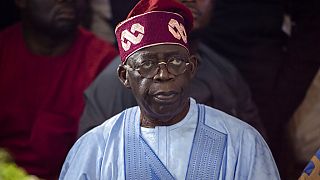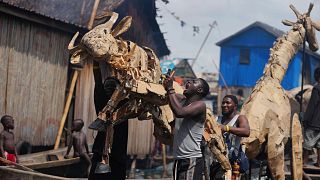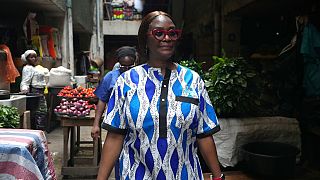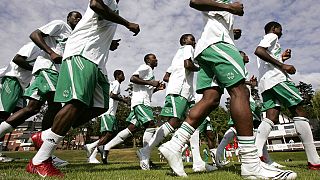Nigeria
Nigeria’s Bola Tinubu has been sworn in as president of Africa’s most populous country at a period of unprecedented challenges, leaving some citizens hopeful for a better life and others skeptical that his government would perform better than the one he succeeded.
The former governor of Lagos, Nigeria’s economic hub, Tinubu, 71, was sworn in as Nigeria’s president in Abuja, the capital city, in the presence of thousands of Nigerians and several heads of governments. He succeeds President Muhammadu Buhari to lead a country that by 2050 is forecast to become the third most populous nation in the world, tied with the United States after India and China.
He has promised to build on Buhari's efforts to deliver democratic dividends to citizens in a country where deadly security crises, widespread poverty, and hunger have left many frustrated and angry. And with his election still being contested in court by opposition parties and among many young Nigerians, Tinubu has also pledged to reunite the country.
His manifesto of “renewed hope” prioritizes the creation of sufficient jobs and ramping up of local production of goods, investing in agriculture and public infrastructure, providing economic opportunities for the poorest and most vulnerable as well as creating better national security architecture to tackle all forms of insecurity.
Mountain of challenges
However, Tinubu’s ambitious plans could be threatened in his first 100 days in office by a mountain of challenges, from insecurity to a fiscal crisis, poverty, and deepening public discontent with the state, said Mucahid Durmaz, Senior West Africa Analyst at risk intelligence company Verisk Maplecroft.
Some analysts also say the promises made by Tinubu and the hope they bring are reminiscent of when Buhari was first elected president in 2015 as a former military head of state. His priorities were to fight insecurity and build the economy but he ended up failing to meet the expectations of many.
“No Nigerian president has come into office with so much goodwill from citizens as President Buhari but no other president has squandered it as quickly as President Buhari did,” said Dr Seun Kolade, a Nigerian development expert and associate professor at De Montfort University, in the U.K. “In terms of expectations and what is possible, this is a very mediocre eight years, to put it mildly."
In Nigeria's capital, Abuja, locals identified economic hardship and insecurity as the biggest challenges they struggled with during Buhari's eight-year rule. “People have really suffered (during) this period. People have been dying because of a lack of money, and I pray and hope we should not experience this kind of thing again under the new president,” said Princess Taiwo, a fruit seller.
After Sunday Imoke lost his brother to a bombing in the Nyanya suburb in 2014, the trader joined millions to vote out then-president Goodluck Jonathan in the hope of a more secure country. But his hopes were dashed by the outgoing president, he said.
'Buhari did not do well'
“Under Buhari, many people died. Buhari did not do well, he did not do anything and he did not have the fear of God,” said Imoke.
Long before Buhari came to power in 2015, Nigeria’s development has for many years slowed under the weight of poor governance and endemic corruption, making it difficult for citizens to benefit from the country’s high earnings as Africa’s top oil producer.
Though he has whittled down the power of Islamic extremists in the northeast and has built key infrastructure with the aid of foreign loans, many believe the quality of life and standard of living has reduced under Buhari. They cite widening insecurity in other parts of the country, growing poverty as well as an economy struggling with record unemployment, inflation at an 18-year high of 22.2%, and rising debt.
“When you combine the lack of opportunities in an environment that is disabling with a strong youth population that is frustrated, that is a ticking time bomb and that is the story of Nigeria over the past 50 years and Buhari has made it worse,” said development expert Kolade.
Coming from the ruling All Progressives Congress, which has been dogged with allegations of corruption, Tinubu's emergence as Nigeria's president-elect has also drawn concerns about how transparent he would be in office.
Although he has often talked about assembling the best hands to lead Nigeria, the nation's problem has never been about the quality of public officials but about accountability, said Leena Koni Hoffmann-Atar, associate fellow in the Africa program at the Chatham House think tank.
Act quickly anc decisively
“What we underestimate is that for state institutions to be strengthened, beyond the character and competence of the individuals, you have to have processes of accountability. And it remains to be seen whether accountability in state institutions will be strengthened under his administration,” said Hoffmann-Atar.
Tinubu must also act quickly and decisively to tackle Nigeria's security crises with the country already in a critical situation, analysts said.
“There is already a very substantial loss of confidence in the government as a protector of citizens," said Nnamdi Obasi, senior adviser for Nigeria at the International Crisis Group. “If the new government fails to act very decisively, we would have more people seeking their own self-help and protection."
Among those now contemplating self-protection are villagers in north central Plateau state’s Mangu district where gunmen killed more than 100 people in a late-night attack earlier in May. Yaputat Pokyes, one of the survivors, said all that they want from the incoming president is to help them stay alive.
“If he comes, he should give people the security they need,” said Pokyes. "We no longer sleep because of fear; we don’t know when the attackers will come back.”











00:47
Ghana: President Mahama suspends Chief Justice Gertrude Torkornoo
Go to video
Police rescue 33 West Africans from a human trafficking scam in Ivory Coast
Go to video
Pope Francis' funeral scheduled Saturday April 26
Go to video
Funeral held in Kenya for TikTok content moderator
Go to video
Al-Qaida-linked militants attack a strategic town in Somalia
Go to video
Trump administration threatens Harvard over foreign student visas and protest ties